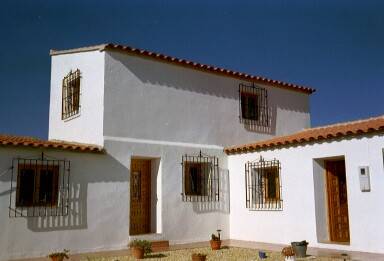
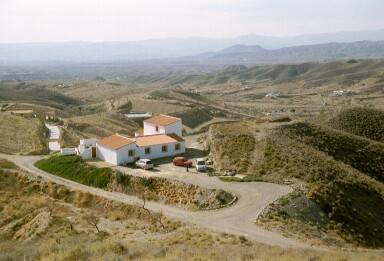
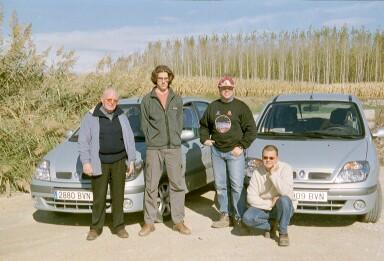
From left to right are: Willy Boens, Simon Vanderkerken, Robert Haas and Hans Huyghe. Photo by Michel Vandeputte.
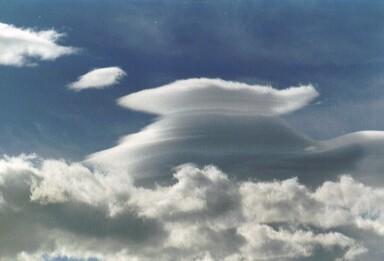
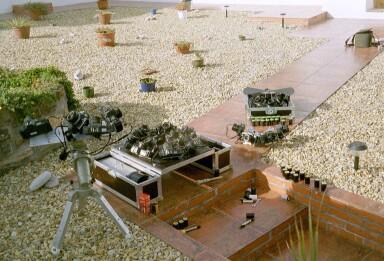
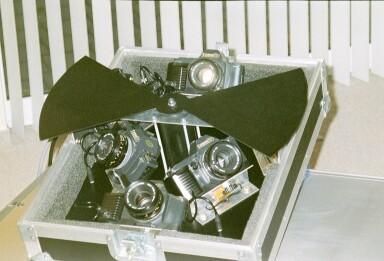
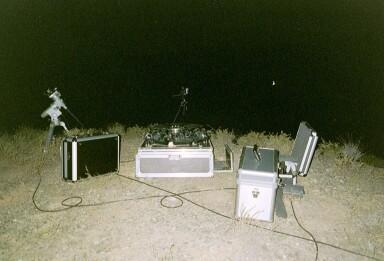
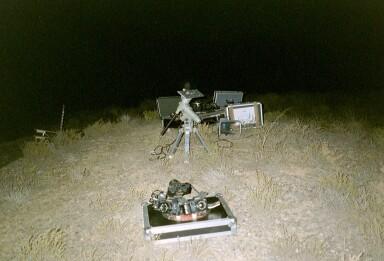

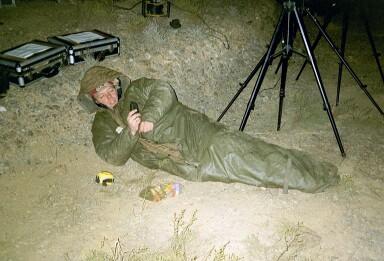
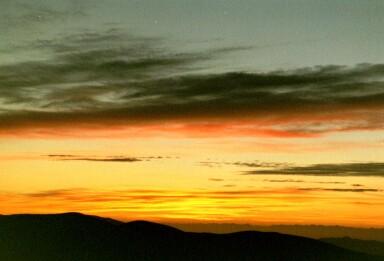
Leonid Observing Campaign 2002 (Part 2) ---------------------------------------------------------- Observer : Vandeputte Michel IMO code : VANMC Visual observing form - summary report ---------------------------------------------------------------------------------------------------------------------------------------------- Day : 18 - 19 Month : 11 Year : 2002 Begin : 22.00 UT End : 06:00 UT Location : St Maria de Nieva, Spain (37.30N - 01.58'E - alt 828 m) Period UT Teff Lm F LEO Others ZHR (preliminary) 22.00 - 23.00 1.00 5.60 1.00 0 10 ---- 23.00 - 00.00 1.00 5.60 1.04 3 6 82+-47 00.00 - 01.00 1.00 5.60 1.00 28 3 229+-43 01.00 - 01.30 0.50 5.30 1.00 20 0 216+-48 01.30 - 03.30 VAR VAR 138 no calculations 03.30 - 03.45 0.25 5.30 1.43 54 0 887+-121 03.45 - 03.50 0.08 5.60 1.25 27 0 926+-178 03.50 - 03.55 0.08 5.60 1.25 41 1 1390+-217 03.55 - 04.00 0.08 5.60 1.11 63 0 2112+-266 04.00 - 04.05 0.08 5.60 1.11 84 0 2475+-270 04.05 - 04.10 0.08 5.60 1.11 84 0 2450+-267 04.10 - 04.15 0.08 5.60 1.11 90 2 2600+-274 04.15 - 04.20 0.08 5.60 1.43 45 0 1660+-247 04.20 - 04.25 0.08 5.60 1.11 69 0 1958+-236 04.25 - 04.30 0.08 5.60 1.43 33 0 1196+-208 04.30 - 04.45 0.25 5.30 1.25 49 1 625+-89 04.45 - 05.00 0.25 5.60 1.25 63 2 640+-81 05.00 - 05.15 0.25 5.30 1.25 35 2 430+-73 05.15 - 05.30 0.25 5.60 1.18 45 0 419+-62 05.30 - 05.45 0.25 5.60 1.18 60 4 533+-71 05.45 - 06.00 0.25 5.30 1.18 33 2 372+-65 06.00 - 06.15 ----- ----- 5 0 22.00 - 06.00 8.00 1069 36 calculations with r=2.00 / gamma : 1.00 Minute countings (maximum period) UT N Leonids remarks 03:46 4 03:47 9 03:48 4 03:49 10 03.50 11 03.51 11 03.52 8 03.53 5 03.54 7 03.55 10 big gap in the (high) clouds... 03.56 10 03.57 14 03.58 14 03.59 15 04.00 14 04.01 17 04.02 20 04.03 21 04.04 12 04.05 14 04.06 18 04.07 16 04.08 15 04.09 21 04.10 23 "maximum" 04.11 18 04.12 21 04.13 18 04.14 10 04.15 10 04.16 9 04.17 5 04.18 14 04.19 7 04.20 12 04.21 22 04.22 10 -8 fireball with 3' golden trail. 04.23 14 04.24 11 04.25 9 04.26 11 04.27 3 more stratus clouds 04.28 6 04.29 4 04.30 9 04.31 6 Magnitude distributions Leonids (1069 measurements) -8(2)-6(2)-4(1)-3(2)-2(7)-1(20)+0(62)+1(82)+2(219)+3(427)+4(239)+5(6) Remarks / impressions We started under totally clear skies. All the equipment was already set up before sun set. Visual observers started at 22.00 UT. The first Leonid earthgrazer was seen by Robert Haas at 23.52 UT. After that moment, it quickly changed…The Lion came alive with some more earth grazers. Activity remained low during the first hours (only a few Leonids/minute). After 01.00 UT, a cirrus curtain of a warm front covered the night sky very quickly. She gave us a beautiful halo around the full moon witch was not precisely the right night for this. Observing was very difficult at that moment ; only the brighter members were still visible. Several times , there was a bigger gap through those high clouds ; but not enough to do some serious observations. Leonid activity was good ; but if she still will grow to storm levels…that was another big question around 3.30 UT. Miracle around 3.45 UT ; a big clear gap was coming into our directions....just in time ! I picked up my minute counting. And I was very surprised ; Leonid activity finally increased...already more than 15 Leonids / minute around 04.00 UT. Almost the whole area around Leo, Hydra and the big bear stayed clear during the maximum period. The moon was hidden behind thicker clouds in the west. The centre of my vision was precisely the radiant of the Leonids. And that sight at the peak moment was really astonishing with regularly point meteors and bursts of 4 –6, mostly faint Leonids, in one time…The real peak moment appeared for me at 04.10 UT with 23 Leonids. I calculated a ZHR of 2500 for the interval 04.00 – 04.10 UT. A –8 Fireball with a 3 minutes golden trail at 04.22 UT was one the highlights of the night. After 04.30 UT activity decreased quickly and observing conditions became also better… Also this year, I am very happy that I witnessed a new, short lived Leonid meteor storm. A bit the little sister of the 1999 Leonid meteor storm…I wasn’t easy to obtain a good data set because of changing observing conditions (high clouds, gaps, changing limited magnitude…) ; I hope that this report is still (partly) useable. One thing is clear for me ; all the displays from 1998 till 2002 were very different and unique to see ! I hope that we will also see some future rains during the coming period 2003-2007… Leonids ; king of the meteor showers !!! Michel Vandeputte - Ronse (Zuid Oost-Vlaanderen) Dutch Meteor Society VVS Belgie - werkgroep meteoren email : michelvandeputte@hotmail.com http://www.gamma-andromeda.be/ "Leonid meteor storm 2002...the final impact"